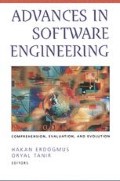Abstract
Over the years, cumulative data have shown that maintenance is a major cost concern—as a matter of fact, a growing cost concern (Pigoski, 1997). The maintainability of a system seems to have much influence on the ease or difficulty to implement changes. A consensus has emerged among the research community that the maintainability of a software system is dependent on its design (Rombach, 1990), in the procedural paradigm as well as in the object-oriented paradigm.
Access this chapter
Tax calculation will be finalised at checkout
Purchases are for personal use only
Preview
Unable to display preview. Download preview PDF.
References
Abreu, F. B. (1994). Object-oriented software engineering: measuring and controlling the development process. In Proceedings of the 4th International Conference on Software Quality,Washington DC, USA.
Alalouf, S., Labelle D., and Menard J. (1990). Introduction à la statistique appliquée Addison-Wesley.
Basili, V. R., Briand L. C., and Melo W. L. (1996). A validation of object-oriented design metrics as quality indicators. IEEE Transactions on Software Engineering, 22 (10): 751–761.
Briand, L. C., Devanbu P., and Melo W. (1997). An investigation into coupling measures for C++. In ICSE97, Boston, MA, pp. 412–421.
Chaumun, M. A. (1998). Change Impact Analysis in Object-Oriented Systems: Conceptual Model and Application to C++. Master’s thesis, Université de Montréal, Canada, November 1998.
Chaumun, M. A., Kabaili, H., Keller R. K., and Lustman, F. (1999). A change impact model for changeability assessment in object-oriented software systems. CSMR99, Proc. Third European conference on Software Maintenance and Reingineering, Amsterdam, The Netherland, pages 130–138, March,, 1999.
Chaumun, M. A., Kabaili, H., Keller, R. K., Lustman, F., and St-Denis, G. (2000). Design properties and object-oriented software changeability. Accepted, CSMR2000, Fourth European Conference on Software Maintenance and Reingineering, Zurich, Switzerland, pages 45–54, February, 2000.
Chidamber, S. R., Darcy D. P., and Kemerer C. F. (1998). Managerial use of metrics for object-oriented software. In IEEE Transactions on Software Engineering, 24 (8): 629–639.
Chidamber, S. R. and Kemerer C. F. (1991). Towards a metrics suite for object- oriented design. In Proceedings OOPSLA, Phoenix, AZ, pp. 197–211.
Chidamber, S. R. and Kemerer C. F. (1994). A metrics suite for object-oriented design. In IEEE Transactions on Software Engineering, 20 (6): 476–493.
Devanbu, P. T. (1992). GENOA–a customizable, language-and front-end independent code analyzer. In Proceedings of the I4th International Conference on Software Engineering, pp. 307–317, Melbourne, Australia.
Han, J. (1997). Supporting impact analysis and change propagation in software engineering environments. In STEP97, London, England, pp. 172–182.
Hsia, P., Gupta, A., Kung, C., Peng, J., Liu, S. (1995). A study of the effect of architecture on maintainability of object-oriented systems. In ICSM95, Nice, France, pp. 4–11.
ISO 9126 Information Technology (1992). Software product evaluation: quality characteristics and guidelines for their use, International Organization for Standardization, Geneva, 1992.
Kazman, R., Abowd, G., Bass, L., and Clements, P. (1996). Scenario-based analysis of software architecture. In IEEE Software, Vol. 13, No. 6, pages 47–55, November 1996.
Kiran, G. A., Haripriya S., and Jalote P. (1995). Effect of object orientation on maintainability of software. In ICSM97, Bari, Italy, pp. 114–121.
Kung, D. C., Gao, J., Hsia, P., Lin, J., Toyoshima, Y. (1995). Class firewall, test order, and regression testing of object-oriented programs. In Journal of Object-Oriented Programming, Vol. 8, No. 2, pages 51–65, May 1995.
Kung, D., Gao, J., Hsia, P., Wen, F., Toyoshima, Y., and Chen, C. (1994). Change impact identification in object oriented software maintenance. In ICSM94, Victoria, B.C., Canada, pages 202–211, September 1994.
Li, W. and Henry S. (1993), Object-oriented metrics that predict maintainability. Journal of Systems and Software, 23: 111–122.
Li,W., Henry, S., Kafura, D., Schulman, R. (1995). Measuring object-oriented design. In Journal of Object-Oriented Programming, Vol. 8, No. 4, pages 48–55, July/August 1995.
Li, Li (1998). Change Impact Analysis for Object-Oriented Software. Ph.D. thesis, George Mason University, Virginia, USA, 1998.
Li,Li and Offutt J. A. (1996). Algorithmic analysis of the impact of changes to object-oriented software. In ICSM96, pp. 171–184.
Lindvall, M. (1997). An Empirical Study of Requirements-Driven Impact Analysis in Object-Oriented Software Evolution. Ph.D. thesis, Linköping University, Sweden, 1997.
Lorenz, M. (1993). Object-Oriented Software Development: A Practical Guide. Englewood Cliffs, NJ: Prentice-Hall.
Matel, J-M. and Nadeau R. (1998). Statistique en gestion et en économie. Gaëtan Morin Éditeur, Montréal, Canada.
Munson, J. C. and Elbaum S. G. (1998). Code churn: A measure for estimating the impact of code change. In Proceedings of the International Conference on Software Maintenance (ICSM’98), Bethesda, MD, pp. 24–31.
Pigoski, T. M. (1997). Practical Software Maintenance. New York: John Wiley & Sons.
Poet Software Corporation (1999). POET Java ODMG Binding. On-line docu- mentation, San Mateo, CA, 1999. Available at http:://www.poet.com.
Rombach, H. D. (1990). Design measurement: some lessons learned. In IEEE Software, 7 (2): 17–25.
Rumbaugh, J., Jacobson I., and Booch G. (1999). The Unified Modeling Language Reference Manual. New York: Addison-Wesley.
TakeFive GESMBH (1999). SNiFF+ documentation set. Salzburg, Austria. 1999. Available on-line at: http://www.takefive.com .
Weinand, A., Gamma E., and Marty R. (1989). Design and implementation of ET++, a seamless object-oriented application framework. In Structured Programming, 10 (2): 63–87.
Xforms (1998). Graphical user interface toolkit for X. 1998. Available on-line at http://bragg.phys.uwm.edu /xforms.
Editor information
Rights and permissions
Copyright information
© 2002 Springer Science+Business Media New York
About this chapter
Cite this chapter
Chaumun, M.A., Kabaili, H., Keller, R.K., Lustman, F. (2002). Design Properties and Evolvability of Object-Oriented Systems. In: Erdogmus, H., Tanir, O. (eds) Advances in Software Engineering. Springer, New York, NY. https://doi.org/10.1007/978-0-387-21599-0_10
Download citation
DOI: https://doi.org/10.1007/978-0-387-21599-0_10
Publisher Name: Springer, New York, NY
Print ISBN: 978-1-4419-2878-8
Online ISBN: 978-0-387-21599-0
eBook Packages: Springer Book Archive

